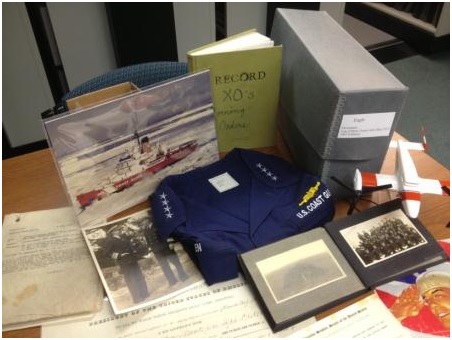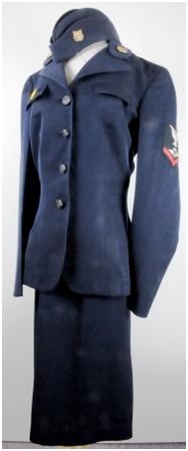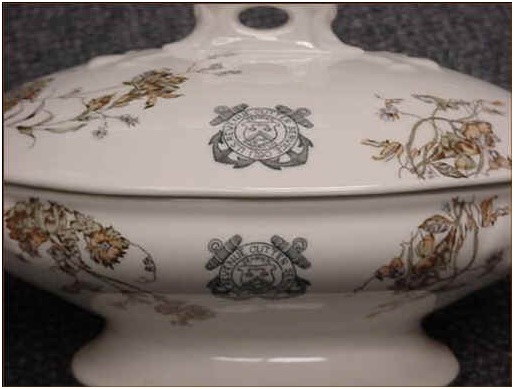Heritage Asset Collection of Art and Artifacts and the Coast Guard Special Collections Library & Archive

Donating Artifacts & Archival Items to the Coast Guard History Program
Thank you for your interest in donating artifacts and/or archival items to the U.S. Coast Guard History & Heritage Program. This page lays out the criteria, requirements and processes that take place for the Coast Guard to accept donations related to the history, heritage and material culture of the Coast Guard. Are you interested in donating an artifact (three dimensional items such as uniforms, swords, personnel effects, equipment, models, etc.) to the Coast Guard Heritage Asset Collection or archival items (personal or official papers, records, reports, letters, diaries, scrapbooks and photographs, etc.) to the Coast Guard Special Collections Library and Archives?
Artifacts
These are the criteria for accepting an artifact into the Coast Guard Heritage Asset Collection:
1) Historical significance and context: The item must have a clear connection to the Coast Guard or any of its predecessor or related agencies. The item should be accompanied with supporting documentation.
2) Relevance: The item must provide historical and educational value. All items accepted should have an historical, education, exhibition, and/or programmatic use.
3) Condition and preservation needs: The object must be in fair condition. Curatorial Services must be able to store the item appropriately based on its materials, condition, and needs. If the object is in poor condition, it must have significant relevance and context and must be able to be conserved as part of its long-term storage plans. Curatorial Services must be able to reasonably care for the item in perpetuity.
4) Rarity and/or uniqueness: Items of a rare or unique nature that relate to the Coast Guard or any of its predecessor or related agencies should be collected to represent singular and extraordinary aspects of the agencies’ history.
5) Duplicates: Items that duplicate material already held in the Heritage Asset Collection should not be collected. They should only be considered if the historic context, background, and associated documentation make the item more relevant or rare than what is already in the collection.
6) Association or importance of artist or producer: Items associated, used, and/or created by important artistic and Coast Guard figures will be collected.
7) Format or size: Reasonable scale will be considered when assessing an item. Objects with sizes that can negatively impact the ability to provide long term care and storage must be carefully considered to ensure that their historical context and value outweigh the costs of care and housing.

Archival Materials
The Coast Guard Historian's Office maintains an important Special Collections Library and Archive. The Archive consists primarily of archival material that is not included in the official records now held by the National Archives and Records Administration [NARA]. It includes hundreds of thousands of unique images, publications, manuals, directives, personal papers, diaries, scrapbooks, reports, and documents. The material preserved in our archive complements official records now kept at NARA and adds depth to our understanding of all aspects of Coast Guard history. These records come from former commandants, officers, enlisted personnel, civilians and their families.
The Coast Guard Historian's Office photography collection is one of the largest collections of Coast Guard-related photography in the world outside of what is held by NARA. It consists of distinct imagery slides dating from the post-Civil War-era to the early 1990s. Images include lighthouses, cutters, lighthouse tenders, light vessels, combat images (especially from World War II and Vietnam), personnel, lifeboat, aircraft, air stations, personnel and significant operational cases. This collection also includes several thousand books, pamphlets, manuals, directives, instructions and newsletters that deal specifically with the Coast Guard or are Coast Guard publications. Most significant are the old manuals, service publications and back issues of most of the periodicals published by the service.
Acquisition Process and Restrictions for the Coast Guard Heritage Asset Collection
The Coast Guard may not solicit for nor expend appropriated funds to acquire artifacts. No personnel of Coast Guard Curatorial Services or the Coast Guard may provide written or verbal appraisals of a donated item to its donor. Donors requiring appraisals of donated items must obtain such appraisals at their own expense using appraisers of their choice. Coast Guard personnel may not recommend any one appraiser but may provide the donor with a general list of appraisers, if the donor so requests. Donations must be made unconditionally.
All acquisitions must be approved by Commandant (CG-09231) and require ethical review via CG-094 (Legal). Authority to approve acquisitions for the Coast Guard Heritage Asset Collection valued up to $2,000.00 is delegated to the Chief Historian. All items with a value greater than $3,000.00 must go to CG-094 for gift review and CG-08 for acceptance. No restrictive or conditional acquisitions (through donation, purchase or transfer) may be accepted for the collection, except by direction of Commandant (CG-09231).
All artifacts, when accepted by any representative of the Coast Guard, become the property of the US Coast Guard. The Coast Guard will not accept permanent loans of historical property, except by direction of Commandant (CG-09231). The Coast Guard will only accept incoming loans if there is a definitive plan to exhibit the loaned material for a set amount of time.
Contact & Further Information
For more information on donating artifacts and archival materials to the Coast Guard, please contact us at History@uscg.mil.
The Coast Guard Heritage Asset Accession Committee will make the final determination on whether the Coast Guard will accept any donation offers. The Heritage Asset Accession Committee is made up of the Chief Historian, the Deputy Historian, the Coast Guard Curator, the Curator of the Coast Guard Academy Museum, the Coast Guard Collections Manager, the Curator of the National Coast Guard Museum and the Coast Guard Archivist. We may also include the Coast Guard Academy Library's Special Collections Librarian for donation offers relating to the history of the Coast Guard Academy and other subject-matter-experts if needed.
Thank you for your interest in preserving all aspects of Coast Guard history.
